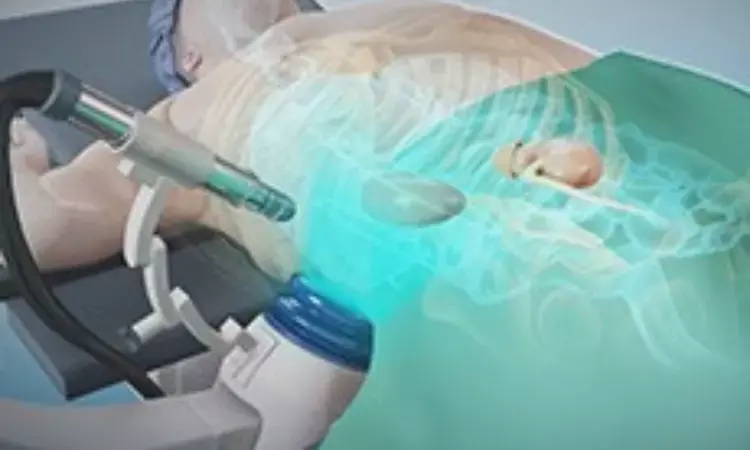- Home
- Medical news & Guidelines
- Anesthesiology
- Cardiology and CTVS
- Critical Care
- Dentistry
- Dermatology
- Diabetes and Endocrinology
- ENT
- Gastroenterology
- Medicine
- Nephrology
- Neurology
- Obstretics-Gynaecology
- Oncology
- Ophthalmology
- Orthopaedics
- Pediatrics-Neonatology
- Psychiatry
- Pulmonology
- Radiology
- Surgery
- Urology
- Laboratory Medicine
- Diet
- Nursing
- Paramedical
- Physiotherapy
- Health news
- Fact Check
- Bone Health Fact Check
- Brain Health Fact Check
- Cancer Related Fact Check
- Child Care Fact Check
- Dental and oral health fact check
- Diabetes and metabolic health fact check
- Diet and Nutrition Fact Check
- Eye and ENT Care Fact Check
- Fitness fact check
- Gut health fact check
- Heart health fact check
- Kidney health fact check
- Medical education fact check
- Men's health fact check
- Respiratory fact check
- Skin and hair care fact check
- Vaccine and Immunization fact check
- Women's health fact check
- AYUSH
- State News
- Andaman and Nicobar Islands
- Andhra Pradesh
- Arunachal Pradesh
- Assam
- Bihar
- Chandigarh
- Chattisgarh
- Dadra and Nagar Haveli
- Daman and Diu
- Delhi
- Goa
- Gujarat
- Haryana
- Himachal Pradesh
- Jammu & Kashmir
- Jharkhand
- Karnataka
- Kerala
- Ladakh
- Lakshadweep
- Madhya Pradesh
- Maharashtra
- Manipur
- Meghalaya
- Mizoram
- Nagaland
- Odisha
- Puducherry
- Punjab
- Rajasthan
- Sikkim
- Tamil Nadu
- Telangana
- Tripura
- Uttar Pradesh
- Uttrakhand
- West Bengal
- Medical Education
- Industry
Renal Pelvis Urine Density Linked to Severe Infections in Post-Lithotripsy Patients: Study

China: In a groundbreaking multi-center prospective study, researchers have unearthed a crucial association between renal pelvis urine density and the peril of severe infectious complications in patients with symptom-free hydronephrosis following shock wave lithotripsy (SWL). The findings, which have significant implications for post-lithotripsy patient care, were published in the latest edition of the renowned medical journal Urolithiasis.
The study revealed a positive linear association between Hounsfield units (HU) in renal pelvis urine and the risk of severe infectious complications in patients with ureteral stones and symptom-free hydronephrosis after SWL, irrespective of gender, age, BMI, stone location, stone size, and hydronephrosis grade. The findings might be helpful in the SWL treatment decision-making process.
"There was a linear association between higher HU values and increased infection risk, & a cut-off value of 12.0 HU was determined, providing 85.94% specificity and 78.59% sensitivity," the researchers reported.
Shock wave lithotripsy, a commonly employed non-invasive procedure for kidney stone removal, has revolutionized urological practice over the past few decades. However, despite its effectiveness, certain patients develop symptom-free hydronephrosis post-SWL, posing a clinical conundrum regarding optimal management strategies and risk assessment for potential complications. So, finding easy-to-obtain and reliable predictors of severe infectious complications after shock wave lithotripsy is a major clinical need, particularly in symptom-free hydronephrosis.
Zhenhua Li, Shengjing Hospital of China Medical University, Shenyang, Liaoning, People’s Republic of China, and colleagues aimed to prospectively investigate the predictive value of Hounsfield units in renal pelvis urine for the risk of severe infectious complications in patients with ureteral stones and symptom-free hydronephrosis after SWL.
For this purpose, the researchers conducted a multi-center prospective study from June 2020 to December 2023. The HU of renal pelvis urine was measured by non-enhanced computed tomography. The severe infectious complications included septic shock, sepsis, and systemic inflammatory response syndrome. Finally, the researchers enrolled 1,436 patients with ureteral stones.
The researchers reported the following findings:
- 8.9% of patients experienced severe infectious complications after SWL treatment.
- After adjusting confounding variables, compared with the patients in the lowest renal pelvis urine density quartile, the OR for the highest quartile was 32.36.
- There was a positive linear association between the HU value of renal pelvis urine and the risk of severe infectious complications after SWL.
- This association was also seen stratified by age, gender, BMI, stone size, stone location and hydronephrosis grade.
- The nonlinear association employed by restricted cubic splines is not statistically significant.
- The AUROC and 95%CI of renal pelvis urine density were 0.895.
- The cut-off value was 12.0 HU with 78.59% sensitivity and 85.94% specificity.
"The findings underscored the potential of renal pelvis urine density, measured in HU, as a reliable predictor for infectious complications post-SWL in patients with ureteral stones and symptom-free hydronephrosis," the researchers wrote.
Reference:
Liu, D., Liu, J., Li, Z. et al. The association between renal pelvis urine density and the risk of severe infectious complications in patient with symptom-free hydronephrosis after shock wave lithotripsy: a multi-center prospective study. Urolithiasis 52, 72 (2024). https://doi.org/10.1007/s00240-024-01572-5
Dr Kamal Kant Kohli-MBBS, DTCD- a chest specialist with more than 30 years of practice and a flair for writing clinical articles, Dr Kamal Kant Kohli joined Medical Dialogues as a Chief Editor of Medical News. Besides writing articles, as an editor, he proofreads and verifies all the medical content published on Medical Dialogues including those coming from journals, studies,medical conferences,guidelines etc. Email: drkohli@medicaldialogues.in. Contact no. 011-43720751


